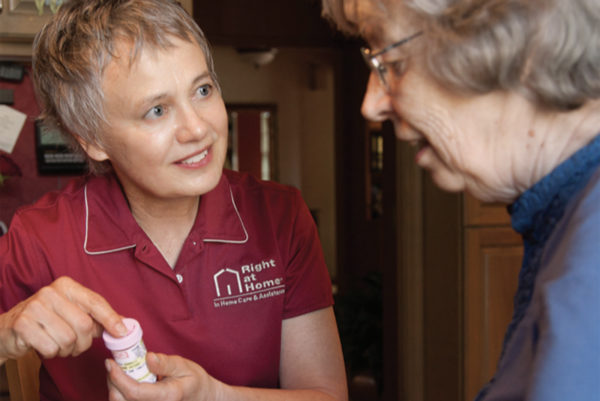Aging Right @ Home is a monthly blog series, answering your questions on providing care for individuals with disabilities, loved ones with dementia and older adults aging in place. If you have a question, please submit it to [email protected].
 Medications play an important role in improving the health and preserving the independence of aging adults by helping control many health conditions, such as heart disease, arthritis, diabetes, high blood pressure, osteoporosis and chronic pain, among others.
Medications play an important role in improving the health and preserving the independence of aging adults by helping control many health conditions, such as heart disease, arthritis, diabetes, high blood pressure, osteoporosis and chronic pain, among others.
This medication can help restore daily life for many seniors, but often medication management becomes a major challenge for older patients. Medications, or combinations of medications, can cause side effects, such as dizziness, depression, digestive problems and even confusion that might be mistaken for dementia. It could also increase the risk of falls and other injuries.
Managing medications in our later years can be challenging for several reasons. However, the top challenge is that seniors take a lot of medications. Experts from the University of Michigan looked at the data of people on Medicare Part D (prescription drug plans) and found that these seniors take an average of 4.5 drugs — and sometimes upward of 10. Doctors and pharmacists have deemed this situation “polypharmacy.”
To limit the negative effects of polypharmacy, older patients should be partners in their own care. If you are a family caregiver to an aging adult, here are ways you can provide support:
- Get a medication review. Today’s seniors are likely to have a number of health care providers, which could lead to an issue where one doctor prescribes a drug and other providers don’t know about it. Having a single doctor or pharmacist evaluate all medications can limit this risk. (Also, people on Medicare Part D should know their plan may offer a free, in-depth review for enrollees.)
- Use a single pharmacy if possible. This way the pharmacist has a record of all the medications you take, which makes it easier to spot any possible “red flag combinations” that could cause a bad interaction.
- Don’t hesitate to bring up the cost. Today, the high price of many prescription drugs leads some seniors to split pills, skip doses or fail to fill a prescription. If a drug is costly or is not covered by your insurance, ask the doctor if there is a generic or less expensive alternative.
- Talk to the doctor about alternatives to medications. For certain conditions, lifestyle changes such as increased exercise and improved diet, or physical treatments such as physical therapy, can be beneficial and can reduce the need for medications.
Home care can also help. Professional in-home care can be a valuable resource for successful medication management. Non-medical home care professionals can provide transportation to the pharmacy or pick up prescriptions, while skilled nursing services could also be provided in the home. If you are thinking of receiving home care for a loved one, Right at Home care experts work with families to support the needs of senior loved ones and family caregivers alike. Contact me today with any questions you may have or for a personalized care consultation.
Your neighbor, and Owner/President of Right at Home of Northern Virginia,
Phillip Turner, CDP, CSA
Each month readers can submit questions to Phillip Turner (CSA, CDP), the Owner and Executive Director of Right At Home Northern Virginia, one of the area’s largest and longest-serving providers of in-home senior care.
As a Certified Senior Advisor (CSA) and a Certified Dementia Practitioner (CDP), Phillip is passionate about providing individualized care, enthusiastic management services and collaborating with other health care providers. If you have a question, please submit it to [email protected].



